Medical & Tourism Apps have been rapidly growing in recent years, as more people are traveling to other countries for affordable healthcare app development solutions.
This surge in medical tourism has created a strong demand for mobile apps that facilitate the process, helping users find healthcare providers, manage appointments, and track medical histories seamlessly.
If you’re considering medical tourism app development, there are several crucial factors to keep in mind, from the app’s design to its features and integrations.
In this blog, we will explore the steps to create a medical tourism app, essential features to include, and how does mobile app development companies can provide a strategic advantage.
Medical tourism is when people travel to another country for affordable healthcare services. It includes treatments like surgeries, dental care, cosmetic procedures, fertility treatments, and wellness therapies.
Many choose medical tourism for high-quality care at lower costs than in their home country.
A Medical Tourism Mobile App simplifies the process of finding and booking medical treatments abroad using smart technology and automation. Here’s how it works:
Note: A Medical Tourism Management Tool ensures efficiency, security, and convenience, making medical travel easy for users while optimizing operations for providers.
Medical tourism is growing rapidly, with patients traveling abroad for affordable, high-quality healthcare services. Investing in a medical travel app can enhance customer experience, streamline operations, and boost business growth.
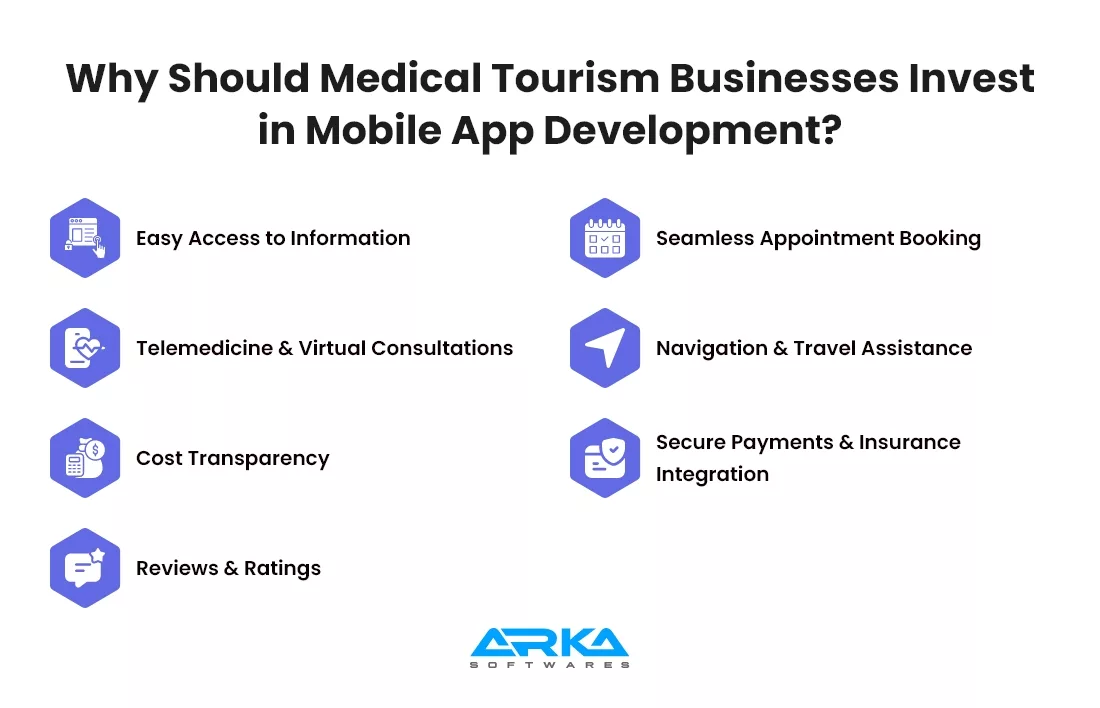
Many patients seek medical tourism services due to:
Treatments in countries like India, Thailand, and Mexico can be 50–80% cheaper than in the U.S. or Europe.
Patients facing long wait times for surgeries in countries like Canada or the UK opt for faster treatment abroad.
Some destinations offer great procedures that may not be available locally.
Some individuals prefer undergoing medical procedures discreetly away from their home country.
Many patients use medical trips as an opportunity to explore a new country post-recovery.
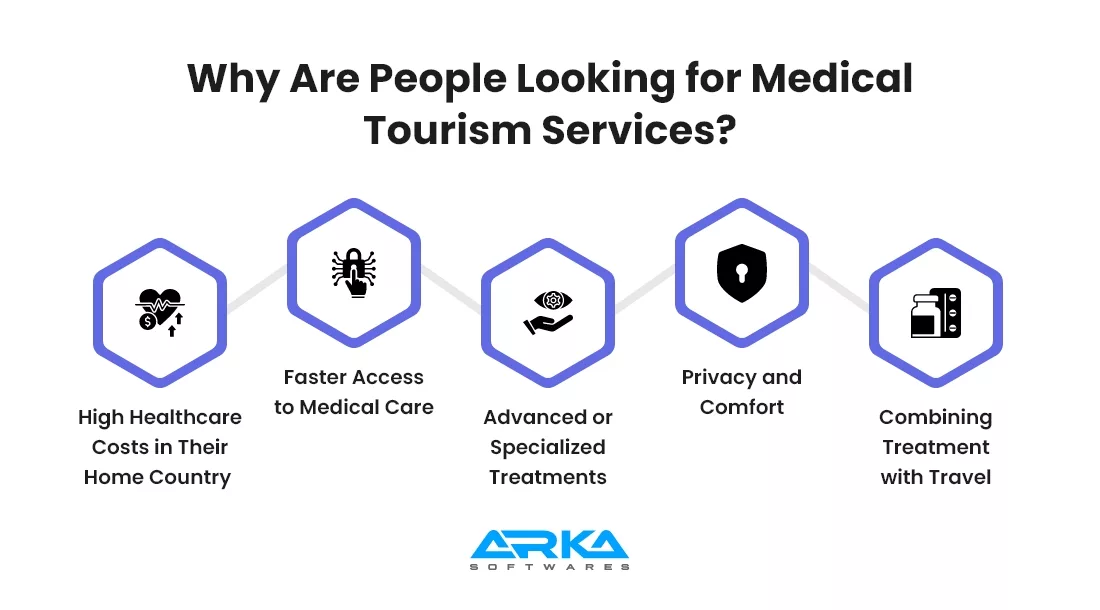
A U.S. patient needing dental implants, which cost $3,000+ per tooth in the U.S., travels to Mexico, where the same procedure costs $700–$1,000 per tooth. The patient books everything through a medical tourism crm app choosing a clinic, scheduling treatment, arranging accommodation, and paying securely.
A patient from the UK travels to Istanbul, Turkey, for a hair transplant that costs around $2,000–$4,000, compared to $8,000–$15,000 in the UK.
The medical tourism crm app helps them compare clinics, book appointments, find accommodation, and arrange airport transfers.
A U.S. patient needs a knee replacement, which costs $40,000–$60,000 in the U.S.The same procedure in India costs $5,000–$8,000, with best hospitals and internationally accredited surgeons. Through the app, they schedule a virtual consultation, review hospital accreditations, and arrange travel plans.
A couple from the U.S. seeks IVF treatment in Spain, where costs range from $4,000–$7,000, compared to $12,000–$20,000 in the U.S.The app helps them find top fertility clinics, review success rates, and book their treatment plan.
App development streamlines booking, communication, and care coordination, enhancing convenience and trust for medical tourism patients.
Automated booking systems reduce administrative workload by handling appointment scheduling efficiently. Real-time updates ensure accurate availability of doctors and services. The system minimizes no-shows through timely reminders and allows seamless rescheduling or cancellations.
Digital marketing tools increase global visibility, allowing healthcare providers to reach international audiences. Targeted advertising promotes specific treatments and locations. SEO-driven content boosts searchability, while patient reviews and testimonials enhance credibility.
Real-time chat and video consultations make it easy for patients to connect with specialists worldwide. Multilingual support enhances accessibility, while secure, HIPAA/GDPR-compliant messaging protects privacy. Virtual pre-arrival consultations reduce unnecessary travel.
Healthcare platforms support multi-currency transactions and various payment gateways. They provide transparent cost breakdowns and secure payment processing with fraud protection. Automated invoicing and financial tracking simplify record-keeping, while financing options and installment plans make medical services accessible for international patients.
Analytics tools track patient inquiries, bookings, and feedback to highlight demand trends. Insights help optimize pricing strategies and improve operational efficiency. Platforms identify service bottlenecks and benchmark performance against competitors, guiding healthcare providers in strategic planning.
Patients can easily access information on hospitals, doctors, and treatments across countries. The platform allows comparisons of costs, destinations, and providers, filtered by type and budget. Instant booking options reduce dependency on agents and simplify the overall medical travel process.
Therefore there are different medical tourism management tools that have integrated features to enable users to book flights and accommodations within the app. Visa assistance and documentation help ensure smooth travel. The platform suggests transport options, nearby hotels, and recovery centers, and includes essential info on emergency contacts and travel insurance.
24/7 multilingual support ensures that patients feel assisted throughout their journey. Real-time messaging connects them directly with doctors and facilitators. Automated alerts keep them informed about medications and appointments, while secure record sharing facilitates consultations and virtual second opinions before travel.
Patients are provided with a clear cost breakdown for treatments and services. Secure online payments and support for multiple methods ensure convenience. Financing options, estimates for recovery expenses, and tools to track spending simplify insurance claims and reimbursement processes.
Virtual follow-ups with doctors keep patients connected after treatment. Medical tourism management tool helps in creating Personalized dashboards track recovery progress, while the app sends medication and care reminders.
Tips for exercise, diet, and health management support healing, alongside access to online communities.
A medical tourism management app must include advanced features to help patients, healthcare providers, and administrators streamline healthcare travel efficiently.
With AI-driven solutions, a medical tourism CRM ensures seamless operations, better communication, and enhanced patient experiences.
A multi-factor authentication system ensures data security, protecting personal and medical information. Encrypted login credentials and biometric options enhance safety while enabling seamless access across devices.
AI-driven translation services break language barriers, allowing users to navigate the platform, communicate with doctors, and understand treatment plans in their preferred language, improving accessibility and comfort.
Intelligent algorithms analyze medical history, treatment needs, and financial preferences to suggest the best hospitals and doctors, optimizing medical tourism choices for better health outcomes.
Built-in telehealth functionality enables remote consultations with specialists, allowing users to discuss treatment plans, receive second opinions, and clarify doubts before traveling.
An integrated itinerary planner streamlines flight bookings, hotel accommodations, hospital visits, and sightseeing options, ensuring a well-organized and stress-free medical journey.
Medical tourism records management app is a cloud-based, HIPAA-compliant storage system allows patients to securely upload, access, and share medical records with healthcare providers, ensuring efficient and informed treatment.
AI-driven cost estimators provide a transparent breakdown of treatment, travel, and accommodation costs. Integrated payment gateways support credit/debit cards, EMI options, and insurance claims.
Medical tourism management tools automates travel coordination features arrange flights, accommodations, and local transport, ensuring smooth transitions from airport pickup to hospital check-in and city navigation.
Providers can showcase credentials, specialties, infrastructure, success rates, and available treatments, helping patients make informed choices about their healthcare providers.
Automated scheduling tools streamline patient appointments, treatment sessions, and post-care follow-ups, reducing administrative burden and optimizing patient experience.
A smart CRM system tracks patient inquiries, medical history, preferences, and progress, improving patient engagement and personalized care.
Secure messaging and video call features facilitate direct communication between patients and providers, ensuring instant clarification on treatments and medical reports.
Patients can leave feedback on doctors, hospitals, and treatments, allowing providers to build credibility and improve service quality based on insights.
Provides real-time insights into patient trends, provider performance, and operational efficiency, helping administrators make data-driven decisions.
Detects suspicious activities like fake profiles, false reviews, or insurance fraud, ensuring adherence to international healthcare regulations and ethical practices.
Reduces manual tasks by automating patient updates, appointment reminders, and policy changes through push notifications, SMS, and emails.
Implements end-to-end encryption and role-based permissions to protect patient data, ensuring compliance with regulations like HIPAA and GDPR.
Moreover, a well-designed medical tourism customer relationship management app enhances the efficiency of the medical tourism process, making healthcare travel more accessible, secure, and hassle-free for patients worldwide.
While developing medical tourism customer relationship management app there are certain steps which are involved. To give you the detailed version about it, given below are some steps of it:
Consult industry experts to understand market needs, compliance requirements, and patient expectations. Define key features, target audience, and competitive advantages. Plan marketing strategies for pre-launch, launch, and post-launch to maximize user acquisition and engagement. Ensure the app aligns with medical regulations and industry standards.
Choose a developer or team experienced in healthcare apps, ensuring compliance with HIPAA, GDPR, and other medical regulations. They should integrate secure payment gateways, telemedicine features, multilingual support, and a seamless user experience. Review their portfolio, expertise in security protocols, and ability to build scalable, reliable applications.
Design the app’s structure with wireframes, then create mockups for a visual representation. Prototypes allow interactive testing to refine user experience before development.
Key screens include appointment booking, doctor profiles, medical records, and travel assistance. Prioritize intuitive navigation, accessibility, and user-friendly design for global patients.
Develop the app’s front-end and back-end, integrating features like hospital search, booking system, secure payments, AI-driven recommendations, and patient records management.
Ensure smooth interactions between APIs, databases, and the user interface. Focus on fast performance, seamless transitions, and real-time updates to enhance the user experience.
Conduct rigorous testing to ensure the app is functional, secure, and compliant with medical laws. Encrypt patient data, follow healthcare regulations, and optimize speed.
Perform beta testing with real users to gather feedback, fix bugs, and enhance usability. Ensure accessibility and seamless performance across different devices.
Selecting an appropriate technology stack is crucial for the success of your medical tourism app. Leveraging React Native services can be a strategic choice, especially when aiming for cross-platform compatibility. React Native allows developers to build high-performance applications for both Android and iOS using a single codebase, reducing development time and costs. Its robust community support and pre-built components accelerate the development process, ensuring a faster time-to-market.
Execute a strong launch strategy, including app store optimization, paid advertisements, influencer partnerships, and media outreach. Offer discounts and referral programs to attract users. Conduct a virtual launch event or webinar.
Post-launch, engage users with push notifications, content marketing, and continuous feature enhancements based on feedback.
Regularly update the app to fix bugs, improve security, and introduce new features. Conduct security audits, optimize performance, and ensure compliance with evolving regulations.
Monitor user feedback to enhance the app experience. Maintain high engagement through content updates, customer support, and marketing efforts to retain users.
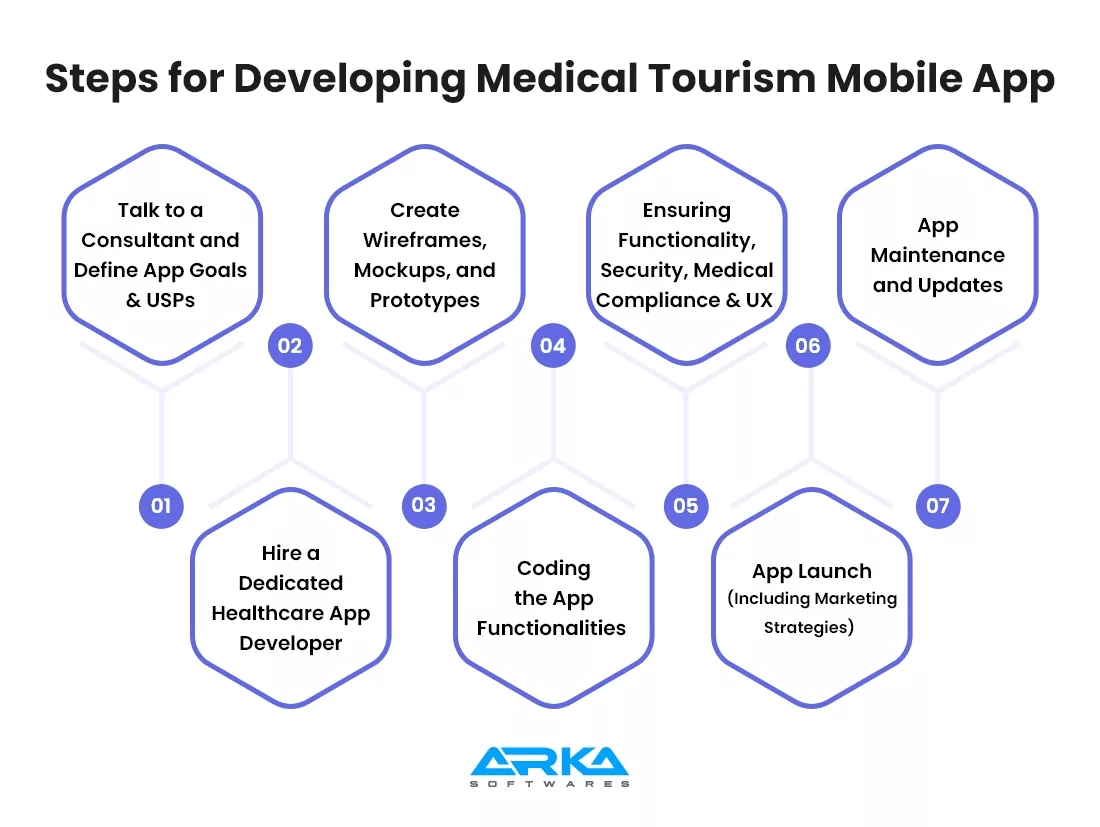
Helping people access quality healthcare treatments abroad is a noble cause. However, sustaining and growing your platform requires a solid monetization strategy.
Without revenue, it becomes challenging to maintain services, enhance user experience, and expand your reach. Here are some effective ways to monetize your medical tourism mobile app:
Offer bundled treatment plans, including consultations, hospital stays, and travel arrangements, at fixed rates. This simplifies costs for users while ensuring steady revenue.
Partner with hospitals, clinics, and healthcare providers to earn a commission on every successful patient booking made through your app.
Display targeted ads from hospitals, wellness centers, airlines, and hotels to generate revenue while providing relevant services to users.
Offer a subscription model with exclusive benefits like priority bookings, discounts on treatments, and personalized medical concierge services.
Collaborate with insurance providers to offer medical travel coverage and easy financing options, earning commissions on each policy or loan.
Partner with travel agencies, wellness retreats, and rehabilitation centers to promote their services while earning a share of the revenue.
Sell essential medical products like medicines, vitamins, mobility aids, and post-treatment recovery kits directly through the app for additional income.
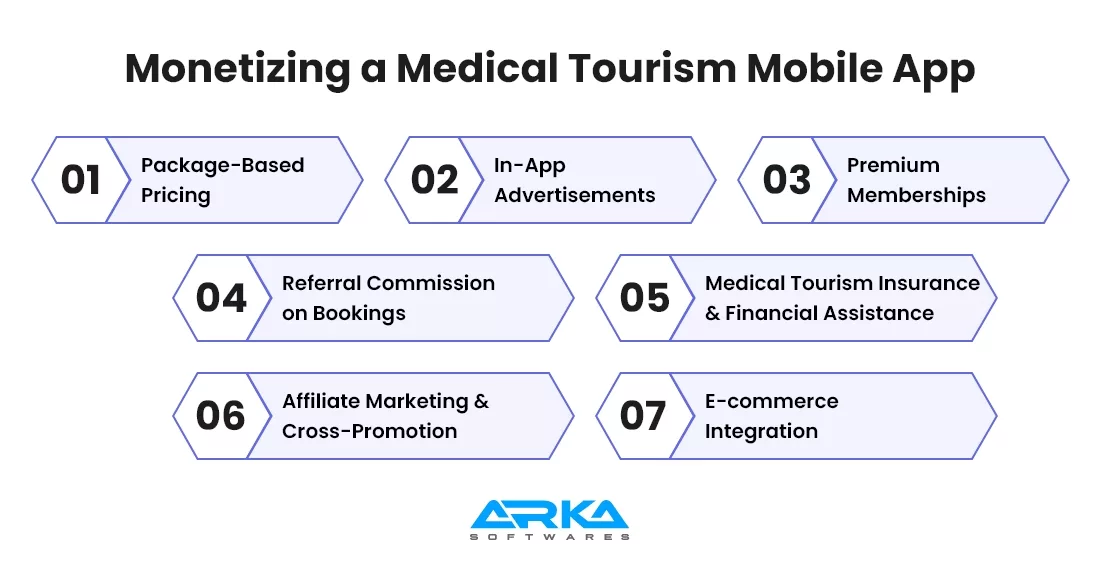
To enter the medical tourism revenue market, you need to see the other players who are performing well and create something different.
Medical Departures connects patients with top-rated hospitals and clinics worldwide. It offers price comparisons, verified patient reviews, and detailed provider profiles to help users make informed decisions.
The platform also assists with appointment scheduling, ensuring a seamless medical travel experience with access to affordable, high-quality healthcare services abroad.
Hospals is a comprehensive medical tourism platform providing end-to-end assistance for international patients. It helps with visa arrangements, doctor consultations, hospital bookings, and travel logistics.
The app partners with leading hospitals across various countries, ensuring quality treatment at competitive prices, while also offering post-treatment care and follow-up support.
PlacidWay is a global medical tourism marketplace that connects patients with healthcare providers in over 40 countries. It offers a wide range of treatment options, from cosmetic surgery to complex medical procedures.
The app provides cost comparisons, multilingual support, and patient testimonials to enhance trust and simplify the decision-making process.
Medigo simplifies international healthcare access by offering transparent pricing and verified patient reviews. It collaborates with accredited hospitals and specialists worldwide, ensuring high-quality treatments.
The platform also provides travel assistance, insurance coordination, and 24/7 customer support, making it a reliable choice for those seeking medical care abroad.
Bookimed helps users find and book medical treatments abroad with expert guidance. It provides real-time price estimates, hospital comparisons, and direct communication with healthcare providers. The app also offers free consultations, visa support, and post-treatment assistance, making the entire medical tourism process smooth and stress-free.
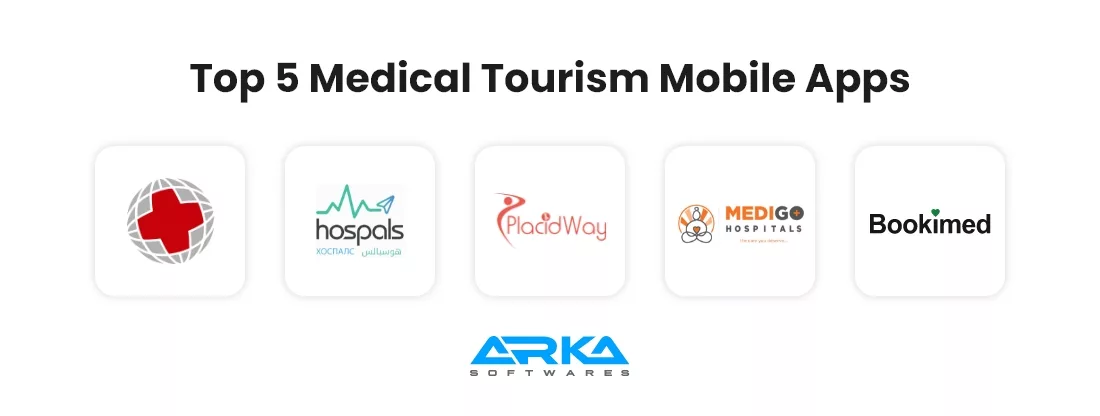
Stats from $20000 can go up to $250000 for exact estimation talk to our consultant who will provide you the exact cost on the basis for factors like app complexity, platform, design, features & functionality, development team, tech stack, backend & database, third-party integrations, maintenance & updates, compliance & security.
Medical tourism or medical travel assistance apps are rapidly growing, and a well-designed medical tourism crm app can revolutionize how patients access international healthcare.
By integrating key features such as teleconsultations, multilingual support, secure payment gateways, and AI-driven recommendations, you can streamline the entire patient journey—from research to recovery.
For healthcare providers and tech entrepreneurs, investing in medical tourism crm app development presents a lucrative opportunity to cater to the increasing demand for cross-border healthcare. Whether your goal is to enhance patient experiences, improve operational efficiency, or tap into the expanding global market, the right technology and strategy can set you apart.
Ready to be a part of the medical tourism app development revenue market? Get in touch with our experienced development team because as a healthcare software development company we bring your vision to life and provide easy healthcare access to patients worldwide.
Yes, medical tourism is a highly profitable industry, driven by affordable healthcare, quality treatment, and increasing global demand.
Implement HIPAA/GDPR compliance, end-to-end encryption, secure authentication, and regular security audits.
User-friendly navigation, multilingual support, secure payment options, doctor/hospital listings, and real-time assistance.
AI can offer chatbot support, personalized recommendations, predictive analytics, and automated scheduling for improved user engagement.
Look for developers with experience in healthcare app development, compliance knowledge, AI expertise, and a strong portfolio in medical tourism solutions and provide healthcare software consulting services as well.